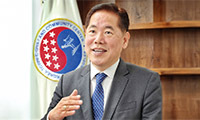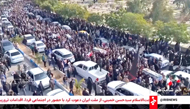As in any sector of society, with power and authority come strong responsibilities. This has never been truer in the Korean corporate world.
Day after day, there are media reports of former top executives being arrested on criminal charges for mishandling management, and not just for embezzlement or misappropriation.
"Increasingly, there are enormous risks involved in assuming top executive positions because many Korean corporations cloak their financial problems," said one business analyst.
In the past, young executives moving rapidly up the corporate ladder were admired and envied by their peers and competitors alike, but these days they are no longer so quick to take on the CEO position.
There are instances when CEOs have to be held accountable for losses and more and more investors are opting to take the top executives to court, which sometimes lands them in jail.
"It is not just a matter of losing everything that you have worked for all your life. There is the real possibility of being convicted of criminal charges," said one executive of a large Korean company.
In fact, there was a case in which a vice president of a subsidiary of a leading conglomerate committed suicide after he was forced to honor a financial guarantee he provided to his company.
Reports have it that he approached the chairman of the conglomerate for help in resolving the issue, since he was basically forced to provide the guarantee as a company executive, but his request was turned down.
"In Korean corporate society, one person sitting at the very top usually calls the important shots and even CEOs are reduced to taking orders," the business analyst said.
Consequently, there are instances when the CEOs can hardly take responsibility for wrong management decisions but the reality is that their signatures are on the dotted line.
In the case of Daewoo, a string of former CEOs at its subsidiaries, including Daewoo Electronics and Daewoo Heavy Industries, were recently arrested for knowingly doctoring their account books to the tune of several trillion won for securing additional loans.
However, insiders point out that decisions carrying such implications and of such magnitude could not have been made without direct orders from the man at the very top, the disgraced Kim Woo-choong.
"It remains to be seen what the extent of their responsibility will be but they certainly would not have seen it coming, particularly when decades-old practices are taken into consideration," the analyst said.
In the past, the worst that could happen to ill-performing CEOs was that they have to resign and leave the company. Now, a CEO could very well face the prospect of losing his job and even his family.
"I think there needs to be a case of checks and balances but some Korean CEOs are facing situations where they really have no say in the decision-making process but have to take the blame," the analyst said.
Said Jwa Seung-hee, president of the Korea Economic Research Institute, "The responsibility has to come side by side with the right to make independent decisions."
"As long as this is not the case, CEOs are going to have a hard time coping with their responsibility and accountability. There has to be room to make the strategically right decisions."
As part of steps to protect themselves from litigation, many CEOs are buying insurance policies.
The government unveiled a plan to take punitive actions against heads of the troubled banks that received taxpayer funds. Executives at such banks as Hanvit and Seoul were worried that they might lose everything.
NCC Widens Smoking Ban to Entire Ilsan Facility
Following the government? recent move to regulate cigarette smoking, a medical facility has announced that smoking will be prohibited in its entire indoor and outdoor area.
"We decided to issue the smoking ban to lead the national campaign against smoking," said an official of the National Cancer Center (NCC) Feb. 4.
Located in Ilsan on about 13,000 pyong of land, the NCC was built to provide high-tech medical care to cancer patients as well as increase the treatment rate of Koreans suffering from the disease. One pyong equals 3.3 square meters.
USFK Denies Alleged Protest Over Mt. Kumgang Project
The U.S. Forces Korea (USFK) Feb. 4 flatly denied a Japanese media report that the USFK registered its protest to Hyundai group over the latter? financial aid to North Korea in November last year.
The Sankei Shimbun of Japan said on Feb. 2 that the U.S. is concerned that the massive cash payment by Hyundai group to North Korea contributed to the enhancement of North Kore? military capability.
The paper also claimed that the USFK command expressed its opposition to the cash payment in a meeting with Hyundai officials in November last year.
스마터리빙
more [ 건강]
[ 건강]이제 혈관 건강도 챙기자!
[현대해운]우리 눈에 보이지 않기 때문에 혈관 건강을 챙기는 것은 결코 쉽지 않은데요. 여러분은 혈관 건강을 유지하기 위해 어떤 노력을 하시나요?
 [ 건강]
[ 건강]내 몸이 건강해지는 과일궁합
 [ 라이프]
[ 라이프]벌레야 물럿거라! 천연 해충제 만들기
 [ 건강]
[ 건강]혈압 낮추는데 좋은 식품
[현대해운]혈관 건강은 주로 노화가 진행되면서 지켜야 할 문제라고 인식되어 왔습니다. 최근 생활 패턴과 식생활의 변화로 혈관의 노화 진행이 빨라지고
사람·사람들
more
[한인단체 신년 인터뷰] 시니어센터 이현옥 회장… “풍성하고 아름다운 노년의 공간”
활발한 프로그램 운영과 높은 커뮤니티 참여로 지역 내 대표적인 커뮤니티 기관으로 평가받는 LA 한인타운 시니어&커뮤니티 센터(이하 시니어센터)…

변진섭 ‘희망사항’ 콘서트
센터메디컬그룹이 2026년 새해를 맞아 회원과 가족, 시니어를 위한 문화체험 공연으로 가수 변진섭 콘서트를 오는 2월27일(금) 오후 8시부터…
코윈 LA지부 ‘2026 골프 토너먼트’
세계한민족여성네트워크(KOWIN) LA 지부(회장 김주희)는 오는 2월2일(월) 캘리포니아 웨스턴 힐스 컨트리클럽에서 ‘골프 토너먼트 2026…
남가주 한국학원 새학기 교사연수회
남가주한국학원(이사장 박성수·교육감 신춘상)은 지난 10일 본부 강당에서 2025-26학년도 2학기 교사연수회를 개최했다. 이날 연수회에는 남…
[한인단체 신년 인터뷰] KYCC 송정호 관장… …
LA 한인타운 대표 비영리단체 한인타운청소년회관(KYCC)의 송정호 관장은 “지금 우리가 하는 일은 커뮤니티 ‘니즈’가 있기 때문에 존재한다”…
많이 본 기사
- 한인 변호사가 ‘신탁자금 횡령’… 줄줄이 ‘중징계’
- 골프 카트 전복… 50대 남성 사망
- 무서운 ‘독감’… 한인 5세 아동 사망
- “목회자도 생활비 필요한데”… 외면돼 온 재정 현실
- ‘김국진 아내’ 강수지 “ ‘프랑스 유학’ 딸 비비아나 ‘국제결혼?’, 안 된다 생각한 적 없다”
- 취업비자 심사 강화… 인터뷰 연기·지연 속출
- ‘북한으로 무기 밀수’ 중국인 등 7명 기소
- LA 교육구 일제히 개학… 활기 되찾은 타운 학교들
- 강성연, 열애 고백 “싱글맘 NO, 좋은 사람 만났다..걱정 그만”
- 채리나, 주식 ‘초대박’ 났다 “7년 전부터 엔비디아 보유..800% 수익”
- 2,000달러 ‘관세 배당’ 연소득 10만불 이하 유력
- “귀화 시민권 박탈 기준 검토” 파장 1
- 30년 평균 모기지 금리 5%대로 하락
- 이윤진, 드디어 새 시작 알렸다.. “발리 리조트 韓대표”
- “노래방 불법 운영 자율적 규제… 치안 협조”
- ‘종말의 날’ 비행기가 왜 LA에?
- 아르헨티나 대형 산불… “20년래 최악의 환경비극”
- ‘케데헌’ 골든글로브 2관왕… 오스카 보인다
- 안효섭, ‘케데헌’으로 ‘지미 팰런 쇼’· ‘투데이쇼’ 출연
- Z세대, 종교 정체성과 종교 실천 괴리 작아
- “최대 6천불 추가 공제돼요”
- “해외 한인 인재들 공직자 유치”
- VA 페어팩스 세금 폭탄에 기업·주민‘탈출 러시’우려
- 공화의원, ‘그린란드 美 51번째주 편입’ 법안 발의
- 먼로 독트린과 돈로 독트린
- 올해 IRS(연방 국세청) 세금보고 개막… 26일부터 접수 시작
- [화요칼럼] 어머님 전(前) 상서
- 미네소타 시위 확산에 ‘강경 대응’
- 갑자기 쥐어짜는 듯한 복통·설사·혈변… ‘허혈성 대장염’
- 트럼프, 그린란드 희토류 탐내지만… “채굴도, 정제도 어려워”
- 카드 이자 10%로 제한 트럼프, 새 규제 추진
- [쿠쿠 아메리카] 조용한 혁신 담은 ‘스테인레스 내솥’ 무료 증정 이벤트
- 트렌턴, 멜로스, 시실리, 레욱트라
- 남가주 한국학원 새학기 교사연수회
- 또또 반전.. “1년간 법카 1억 넘게 쓰고, 합의금 5억 요구” 박나래 前 매니저 ‘새 녹취록’, 진실은
- 광복회, 회장 연임 무효 논란 ‘내홍’
- [경제 트렌드] 스타트업서 가장 인기있는 창업자 학위는
- 법무부, 연준 파월 의장 수사 개시 ‘파문’
- “이란 시위로 648명 사망… 6천명 넘게 숨졌을 가능성”
- 돌파구 못찾는 LG그룹… 시총 4위마저 흔들
- 단국대 미주문학아카데미 무료 강좌
- [뉴스타부동산그룹] 창립 38주년, 2026년에도 변함없는 ‘신뢰 경영’
- “이란 시위로 648명 사망…6천명 넘게 숨졌을 가능성”
- 트럼프 이민 규제에… ‘美입국 일본인 유학생’ 3천명 감소
- 새 VA 주지사는 의원을 좋아해
- [업계 소식] 목, 허리 디스크및 협착증 치료 최고 권위
- 애플, AI파트너로 구글 제미나이 낙점
- 한인은행 자산·외형 성장세 지속… 호프·한미 ‘탑10’
- 국제 금값 최고치 경신 연준의장 기소위협 요인
- 유니스 이 신임이사장 한국어 진흥재단 선출
1/5지식톡

-
 한국 안경을 무료 배송으로 받아보실…
0
한국 안경을 무료 배송으로 받아보실…
0안녕하세요. 서울 안암동에 위치한 ‘보고싶다 안경원’입니다.저희는 다년간 한국 고객분들께 착용감 좋은 안경테와 한국안경브랜드,고압축 도수 렌즈를 합리적인 가격에 제공해온 안경 전문점입니다.이번에 해외 배송이 가능해…
-
 미 육군 사관학교 West Poin…
0
미 육군 사관학교 West Poin…
0https://youtu.be/SxD8cEhNV6Q연락처:wpkapca@gmail.comJohn Choi: 714-716-6414West Point 합격증을 받으셨나요?미 육군사관학교 West Point 학부모 모…
-
 ☝️해외에서도 가능한 한국어 선생님…
0
☝️해외에서도 가능한 한국어 선생님…
0이 영상 하나면 충분합니다!♥️상담신청문의♥️☝️ 문의 폭주로 '선착순 상담'만 진행합니다.☎️ : 02-6213-9094✨카카오톡ID : @GOODEDU77 (@골뱅이 꼭 붙여주셔야합니다…
-
 테슬라 자동차 시트커버 장착
0
테슬라 자동차 시트커버 장착
0테슬라 시트커버, 사놓고 아직 못 씌우셨죠?장착이 생각보다 쉽지 않습니다.20년 경력 전문가에게 맡기세요 — 깔끔하고 딱 맞게 장착해드립니다!장착비용:앞좌석: $40뒷좌석: $60앞·뒷좌석 …
-
 식당용 부탄가스
0
식당용 부탄가스
0식당용 부탄가스 홀세일 합니다 로스앤젤레스 다운타운 픽업 가능 안녕 하세요?강아지 & 고양이 모든 애완동물 / 반려동물 식품 & 모든 애완동물/반려동물 관련 제품들 전문적으로 홀세일/취급하는 회사 입니다 100% …
케이타운 1번가
오피니언
 노세희 부국장대우·사회부장
노세희 부국장대우·사회부장 먼로 독트린과 돈로 독트린
 민경훈 논설위원
민경훈 논설위원트렌턴, 멜로스, 시실리, 레욱트라
 한형석 사회부 부장대우
한형석 사회부 부장대우 LA 시장 선거 구도와 선택지
 정유환 수필가
정유환 수필가 [화요칼럼] 어머님 전(前) 상서
 이왕구 / 한국일보 논설위원
이왕구 / 한국일보 논설위원[지평선] 다시 듣는 김광석
 박기섭
박기섭 ‘눈의 詩經’
 옥세철 논설위원
옥세철 논설위원‘좀비(zombie)체제’가 무너질 때…

돈로 독트린
 조지 F·윌 워싱턴포스트 칼럼니스트
조지 F·윌 워싱턴포스트 칼럼니스트 [조지 F. 윌 칼럼] 트럼프의 무면허 괴물 사냥
1/3지사별 뉴스

‘ICE 총격’ 주말 미 전역 항의 시위
미네소타주 미니애폴리스에서 연방 이민세관단속국(ICE) 요원의 총격에 30대 시민권자 여성이 사망한 사건에 항의하는 대규모 시위가 주말동안 뉴…
“귀화 시민권 박탈 기준 검토” 파장

새 VA 주지사는 의원을 좋아해
민주당 아비가일 스팬버거(Abigail Spanberger) 버지니아 주지사 당선자는 오는 17일 취임을 앞두고 내각 인선을 거의 마무리한 상…
VA 페어팩스 세금 폭탄에 기업·주민‘탈출 러시’우려

트럼프 압박에 파월 ‘발끈’…사상초유 대통령-연준의장 정면충돌
트럼프 대통령과 중앙은행 수장이 정면 충돌하는 사상 초유의 상황이 전개되고 있다.제롬 파월 연방준비제도(Fed·연준) 의장이 자신을 겨냥한 도…
살림으로 뿌리내리다- 테이크루트 안미정 대표의 요리 이야기 (9)

오늘 하루 이 창 열지 않음 닫기 


















































.png)


댓글 안에 당신의 성숙함도 담아 주세요.
'오늘의 한마디'는 기사에 대하여 자신의 생각을 말하고 남의 생각을 들으며 서로 다양한 의견을 나누는 공간입니다. 그러나 간혹 불건전한 내용을 올리시는 분들이 계셔서 건전한 인터넷문화 정착을 위해 아래와 같은 운영원칙을 적용합니다.
자체 모니터링을 통해 아래에 해당하는 내용이 포함된 댓글이 발견되면 예고없이 삭제 조치를 하겠습니다.
불건전한 댓글을 올리거나, 이름에 비속어 및 상대방의 불쾌감을 주는 단어를 사용, 유명인 또는 특정 일반인을 사칭하는 경우 이용에 대한 차단 제재를 받을 수 있습니다. 차단될 경우, 일주일간 댓글을 달수 없게 됩니다.
명예훼손, 개인정보 유출, 욕설 등 법률에 위반되는 댓글은 관계 법령에 의거 민형사상 처벌을 받을 수 있으니 이용에 주의를 부탁드립니다.
Close
x